ABSTRACT
The Journal of the Royal Society of New Zealand will strongly support the new directions of Royal Society Te Apārangi. The future will embrace the wide diversity of people and of knowledge. As the flagship title of the Society, the Journal will continue to serve the research community of New Zealand/Aotearoa and the nearby Pacific. As an e-publication, we have a global reach. Our 2018 Special Issue, ‘Ngā Kete: The Annual Collection of Reviews’, presents the research of our Fellows and Medallists. In 2019, we have expanded our editorial board to 21, to help welcome a wider range of regular manuscripts.
Our publication, the Journal of the Royal Society of New Zealand, will strongly support the new directions espoused by Royal Society Te Apārangi, as outlined by President Wendy Larner (Citation2019) in her recent editorial. The future will embrace the wide diversity of people and of knowledge. As the flagship title of the Society, the Journal will continue to serve the research community of New Zealand/Aotearoa and the nearby Pacific.
We approach a decade of productive partnership with the international publisher Taylor & Francis. The Journal continues to change in important ways, as noted below and on our webpages. The rise of e-publishing has allowed peer-reviewed journals of learned societies or science academies, such as ours, to widen their horizons, and to receive closer scrutiny by readers and would-be authors across the globe. To further disseminate research in Aotearoa, print issues of the Journal are now distributed to the Fellows of Royal Society Te Apārangi.
The journal has endeavoured to improve its quality of content and citability. In search of quality and diversity, since 2017 we have invited researchers recognised by Royal Society (Fellows and Medallists), and recipients of other science honours (such as the Prime Minister’s Science Prizes), to submit a state-of-the-art review article providing in-depth coverage in fields where their research is highly regarded both domestically and internationally. These invited manuscripts are peer-reviewed, then published online, before compilation in print as ‘Ngā Kete: The Annual Collection of Reviews’ starting with volume 48, issues 2–3 in 2018. Thematic Special Issues handled by guest editors play an important role to showcase and highlight the research of a specific area. Such compilations are usually of lasting use to the relevant community, and of the highest quality. Some special issues enable the journal to cover disciplines that have been less represented previously.
We particularly encourage ‘regular’ submissions, because these are the Journal’s foundation. Our horizons are broad: manuscripts may address any discipline represented by Royal Society Te Apārangi whether the research focuses on New Zealand or beyond, providing that the lead author would normally be New Zealand-based, or the research would have been carried out in New Zealand. Manuscripts on exceptional or unusual or inter- or multidisciplinary themes are encouraged. We are unlikely to accept manuscripts that are purely taxonomic, or mainly descriptive, or corroborate well-established patterns and/or processes.
We expanded the editorial board early this year by appointing more editors with expertise in a substantially wider range of subjects. The 21 Associate Editors have early-career to well-established research interests in: medicine; biochemistry, genetics, and molecular biology; biological sciences; engineering and computer science; physics and astronomy; psychology and neuroscience; earth sciences; social sciences; and arts and humanities. These editors are drawn from the universities (Auckland, AUT, Canterbury, Otago, Victoria, Waikato), from a Crown Research Institute, and from a R&D company. All are ready to handle your manuscript.
Thanks for their efforts to the authors and reviewers, to the editors, and to the publishing team at Royal Society Te Apārangi, and particularly to the Publishing Manager, Mr Fei He.
Disclosure statement
No potential conflict of interest was reported by the author.
ORCID
R. Ewan Fordyce http://orcid.org/0000-0002-2656-730X
Reference
- Larner W. 2019. Guest editorial. Journal of the Royal Society of New Zealand. 49:1–2. doi: 10.1080/03036758.2019.1558694
Appendix: Biography of the Associate Editors
Medicine
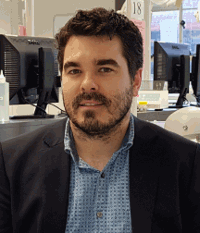 Jonathan Broadbent is a dentist and Associate Professor of Dental Public Health at the University of Otago Faculty of Dentistry. He conducts research as Principal Investigator for the dental component of the Dunedin Multidisciplinary Health and Development Study. His interests include the epidemiology of oral conditions, dental health service delivery, and cross-disciplinary research involving dentistry and other areas of health. He is President of the New Zealand Section of the International Association for Dentistry Research and is a member of the New Zealand Dental Association and the Public Health Association of New Zealand. He is a recipient of awards such as the Health Research Council’s Liley Medal, the NZ Prime Minister’s Science Prize, the NZ Dental Association’s Award for Research, and the NZ Outstanding Young Dentist award. He is scientific editor for the New Zealand Dental Journal and regularly reviews manuscripts for a range of scientific journals.
Jonathan Broadbent is a dentist and Associate Professor of Dental Public Health at the University of Otago Faculty of Dentistry. He conducts research as Principal Investigator for the dental component of the Dunedin Multidisciplinary Health and Development Study. His interests include the epidemiology of oral conditions, dental health service delivery, and cross-disciplinary research involving dentistry and other areas of health. He is President of the New Zealand Section of the International Association for Dentistry Research and is a member of the New Zealand Dental Association and the Public Health Association of New Zealand. He is a recipient of awards such as the Health Research Council’s Liley Medal, the NZ Prime Minister’s Science Prize, the NZ Dental Association’s Award for Research, and the NZ Outstanding Young Dentist award. He is scientific editor for the New Zealand Dental Journal and regularly reviews manuscripts for a range of scientific journals.
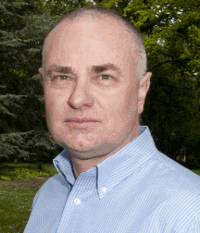 Professor Andrew Day trained in paediatrics in Christchurch and undertook further sub-speciality training in Toronto, Canada. After completing clinical and research training in Canada, Professor Day took up a clinical academic position at University of New South Wales, Sydney, Australia. He returned to New Zealand in 2009 and was appointed to Head of Department of Paediatrics, University of Otago, Christchurch (UOC) in 2010. In 2017, he was appointed to the Cure Kids Chair of Paediatric Research at UOC. Professor Day is a paediatric gastroenterologist. His research interests include Inflammatory Bowel Disease and Coeliac disease, with projects focusing upon host-pathogen interactions in the gut (and how these relate to chronic gut diseases), intestinal inflammatory biomarkers, nutritional aspects of gut diseases and the epidemiology and outcomes of these conditions in children. Professor Day has more than 220 peer-reviewed publications and many book chapters.
Professor Andrew Day trained in paediatrics in Christchurch and undertook further sub-speciality training in Toronto, Canada. After completing clinical and research training in Canada, Professor Day took up a clinical academic position at University of New South Wales, Sydney, Australia. He returned to New Zealand in 2009 and was appointed to Head of Department of Paediatrics, University of Otago, Christchurch (UOC) in 2010. In 2017, he was appointed to the Cure Kids Chair of Paediatric Research at UOC. Professor Day is a paediatric gastroenterologist. His research interests include Inflammatory Bowel Disease and Coeliac disease, with projects focusing upon host-pathogen interactions in the gut (and how these relate to chronic gut diseases), intestinal inflammatory biomarkers, nutritional aspects of gut diseases and the epidemiology and outcomes of these conditions in children. Professor Day has more than 220 peer-reviewed publications and many book chapters.
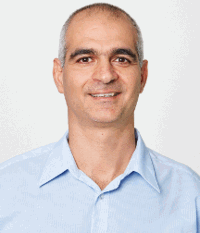 Dr José Derraik is originally from Brazil. He moved to New Zealand in 1995, where he gained a BSc and MSc in Ecology and a PhD in Public Health (University of Otago). His PhD focused on mosquitoes, particularly the likelihood of disease outbreaks in NZ under ongoing anthropogenic environmental changes. Dr Derraik was a Senior Advisor at MAF Biosecurity NZ providing expert advice on threats to human health before joining the Liggins Institute (University of Auckland) in 2008. His research focuses on the long-term effects of early life events (e.g. preterm birth) in childhood and adulthood, as well as on prediction and prevention of childhood obesity. Dr Derraik leads international collaborations in these areas, gaining recognition with appointments as Honorary Associate Professor at the Children’s Hospital at Zhejiang University School of Medicine (Hangzhou, China) and as Honorary Researcher at Uppsala University (Sweden). He has an extensive research portfolio with 150+ peer-reviewed publications.
Dr José Derraik is originally from Brazil. He moved to New Zealand in 1995, where he gained a BSc and MSc in Ecology and a PhD in Public Health (University of Otago). His PhD focused on mosquitoes, particularly the likelihood of disease outbreaks in NZ under ongoing anthropogenic environmental changes. Dr Derraik was a Senior Advisor at MAF Biosecurity NZ providing expert advice on threats to human health before joining the Liggins Institute (University of Auckland) in 2008. His research focuses on the long-term effects of early life events (e.g. preterm birth) in childhood and adulthood, as well as on prediction and prevention of childhood obesity. Dr Derraik leads international collaborations in these areas, gaining recognition with appointments as Honorary Associate Professor at the Children’s Hospital at Zhejiang University School of Medicine (Hangzhou, China) and as Honorary Researcher at Uppsala University (Sweden). He has an extensive research portfolio with 150+ peer-reviewed publications.
Biochemistry, Genetics and Molecular Biology
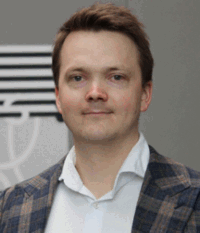 Dr Francis Hunter is a Scientist at Janssen Research and Development and an Adjunct Research Fellow at the Auckland Cancer Society Research Centre, University of Auckland. His research focuses on the use of functional genomic technologies, including high-throughput CRISPR/Cas screens, to identify new therapeutic strategies for cancer and other serious diseases. He is additionally experienced in pharmacology, drug discovery and preclinical development, with expertise in the use of tumour-selective agents for breast and head and neck carcinomas. Dr Hunter is a past Convener and Executive Secretary for the New Zealand Society for Oncology, and the only New Zealander elected to the Associate Member Council of the American Association for Cancer Research. He completed doctoral training in molecular medicine at the University of Auckland before obtaining postdoctoral fellowships from the Cancer Research Trust New Zealand and Royal Society Te Apārangi, supporting postdoctoral training at the Auckland Cancer Society Research Centre and the world-renowned Princess Margaret Hospital in Toronto.
Dr Francis Hunter is a Scientist at Janssen Research and Development and an Adjunct Research Fellow at the Auckland Cancer Society Research Centre, University of Auckland. His research focuses on the use of functional genomic technologies, including high-throughput CRISPR/Cas screens, to identify new therapeutic strategies for cancer and other serious diseases. He is additionally experienced in pharmacology, drug discovery and preclinical development, with expertise in the use of tumour-selective agents for breast and head and neck carcinomas. Dr Hunter is a past Convener and Executive Secretary for the New Zealand Society for Oncology, and the only New Zealander elected to the Associate Member Council of the American Association for Cancer Research. He completed doctoral training in molecular medicine at the University of Auckland before obtaining postdoctoral fellowships from the Cancer Research Trust New Zealand and Royal Society Te Apārangi, supporting postdoctoral training at the Auckland Cancer Society Research Centre and the world-renowned Princess Margaret Hospital in Toronto.
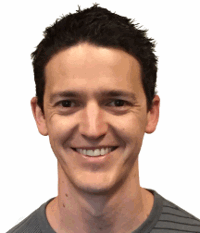 Dr Stephen Jamieson is a pharmacologist with over 15 years’ research experience in anticancer drug discovery. His main research interests include the preclinical development of novel anticancer drugs, the generation of clinically relevant tumour models and the identification of predictive biomarkers to enable precision medicine. He completed his PhD in Pharmacology at the University of Auckland in 2006, before working for two years as a postdoctoral scientist in the drug discovery laboratories at Cancer Research Technology Ltd in London, UK. He returned to the University of Auckland in late 2008 as a Research Fellow and later Senior Research Fellow at the Auckland Cancer Society Research Centre. In 2016, he was appointed to his current dual position in the ACSRC and Department of Pharmacology and Clinical Pharmacology as a Senior Research Fellow / Senior Lecturer. He is also an Associate Investigator of the Maurice Wilkins Centre for Molecular Biodiscovery.
Dr Stephen Jamieson is a pharmacologist with over 15 years’ research experience in anticancer drug discovery. His main research interests include the preclinical development of novel anticancer drugs, the generation of clinically relevant tumour models and the identification of predictive biomarkers to enable precision medicine. He completed his PhD in Pharmacology at the University of Auckland in 2006, before working for two years as a postdoctoral scientist in the drug discovery laboratories at Cancer Research Technology Ltd in London, UK. He returned to the University of Auckland in late 2008 as a Research Fellow and later Senior Research Fellow at the Auckland Cancer Society Research Centre. In 2016, he was appointed to his current dual position in the ACSRC and Department of Pharmacology and Clinical Pharmacology as a Senior Research Fellow / Senior Lecturer. He is also an Associate Investigator of the Maurice Wilkins Centre for Molecular Biodiscovery.
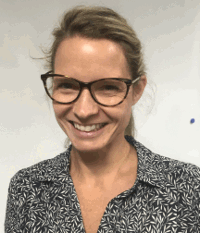 Dr Amy Osborne is a Lecturer in Genomics within the School of Biological Sciences at the University of Canterbury, Christchurch. Originally from the UK, Amy completed a BSc(Hons) in Biomedical Science at King’s College London and followed this by working as a research associate at the Medical Research Council (Imperial College London) studying the genomics of complex diseases. After moving to New Zealand in 2006, Amy spent two years working as a research associate, first in Wellington, and then at the University of Canterbury, Christchurch. Amy undertook her PhD in population genomics at the University of Otago and completed this in 2011 (Dean’s list of Exceptional Theses). Amy has worked as a Postdoctoral Fellow at the University of Colorado Denver (Anschutz Medical Campus), at the University of Otago in Dunedin and also at the University of Otago, Christchurch, with research interests spanning developmental genomics, evolution and development, and epigenetics. Amy’s current main research theme is environmental epigenetics and functional genomics.
Dr Amy Osborne is a Lecturer in Genomics within the School of Biological Sciences at the University of Canterbury, Christchurch. Originally from the UK, Amy completed a BSc(Hons) in Biomedical Science at King’s College London and followed this by working as a research associate at the Medical Research Council (Imperial College London) studying the genomics of complex diseases. After moving to New Zealand in 2006, Amy spent two years working as a research associate, first in Wellington, and then at the University of Canterbury, Christchurch. Amy undertook her PhD in population genomics at the University of Otago and completed this in 2011 (Dean’s list of Exceptional Theses). Amy has worked as a Postdoctoral Fellow at the University of Colorado Denver (Anschutz Medical Campus), at the University of Otago in Dunedin and also at the University of Otago, Christchurch, with research interests spanning developmental genomics, evolution and development, and epigenetics. Amy’s current main research theme is environmental epigenetics and functional genomics.
Biological Sciences
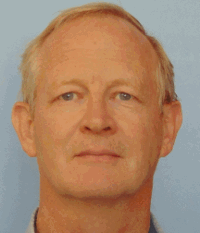 Professor Russell Frew is an analytical chemist in the Chemistry Department, University of Otago. He is Director of the Forensic Analytical Science programme and teaches forensics and environmental chemistry. He has research interests in applying analytical tools, primarily stable isotopes and trace metals, to determining the origin of natural products such as invasive species (biosecurity) or food commodities. Results of this research have been used in policy and the public sector including biosecurity, and as forensic evidence in court work and has been taken up by industry internationally for protection of trade. Professor Frew spent 3.5 years in Vienna with the International Atomic Energy Agency (IAEA) setting up their programme on food authentication and remains involved with the IAEA as a consultant. Other research has focussed on the interaction of chemistry (nutrients) with biology in controlling primary productivity in the oceans and developing novel tools for tracing the flow of nutrients (energy) through food webs.
Professor Russell Frew is an analytical chemist in the Chemistry Department, University of Otago. He is Director of the Forensic Analytical Science programme and teaches forensics and environmental chemistry. He has research interests in applying analytical tools, primarily stable isotopes and trace metals, to determining the origin of natural products such as invasive species (biosecurity) or food commodities. Results of this research have been used in policy and the public sector including biosecurity, and as forensic evidence in court work and has been taken up by industry internationally for protection of trade. Professor Frew spent 3.5 years in Vienna with the International Atomic Energy Agency (IAEA) setting up their programme on food authentication and remains involved with the IAEA as a consultant. Other research has focussed on the interaction of chemistry (nutrients) with biology in controlling primary productivity in the oceans and developing novel tools for tracing the flow of nutrients (energy) through food webs.
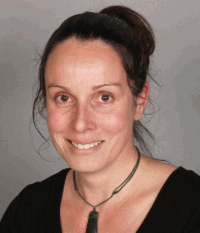 Dr Kelly Hare is a conservation biologist with expertise in ecology, physiology and reproductive biology, particularly of the endemic herpetofauna. She held a lectureship in ecological restoration at Victoria University of Wellington and a FRST-funded postdoctoral fellowship at University of Otago. At Victoria University of Wellington, Kelly developed and implemented a new master’s programme in ecological restoration, and her commitment to post-graduate education led to her present role as Scholarships Manager at the University of Waikato. Kelly’s commitment to environmental initiatives led her to roles such as Trustee of the Urban Wildlife Trust and an international member of the Biophilic Cities Steering Committee. She has served as Associate Scientific Editor for the New Zealand Journal of Ecology, and advisor to conservation organisations including the IUCN Redlist and NZ Department of Conservation.
Dr Kelly Hare is a conservation biologist with expertise in ecology, physiology and reproductive biology, particularly of the endemic herpetofauna. She held a lectureship in ecological restoration at Victoria University of Wellington and a FRST-funded postdoctoral fellowship at University of Otago. At Victoria University of Wellington, Kelly developed and implemented a new master’s programme in ecological restoration, and her commitment to post-graduate education led to her present role as Scholarships Manager at the University of Waikato. Kelly’s commitment to environmental initiatives led her to roles such as Trustee of the Urban Wildlife Trust and an international member of the Biophilic Cities Steering Committee. She has served as Associate Scientific Editor for the New Zealand Journal of Ecology, and advisor to conservation organisations including the IUCN Redlist and NZ Department of Conservation.
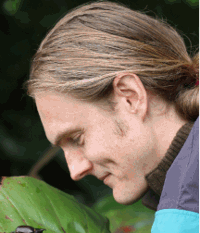 Associate Professor Greg Holwell is a naturalist, zoologist, behavioural ecologist and Associate Professor in the School of Biological Sciences at the University of Auckland. He focuses on terrestrial invertebrates and is driven to understand the reasons behind the diversity in their morphology and behaviour. Greg has explored much of New Zealand, along with Australia and South-East Asia, searching for exciting research topics. Currently, he works on understanding the evolution of diverse and exaggerated weaponry, complex genitalia and elaborate sensory morphology of various invertebrates including harvestmen, spiders, cave wētā, moths and praying mantises. Greg is also interested in camouflage and antipredator adaptations.
Associate Professor Greg Holwell is a naturalist, zoologist, behavioural ecologist and Associate Professor in the School of Biological Sciences at the University of Auckland. He focuses on terrestrial invertebrates and is driven to understand the reasons behind the diversity in their morphology and behaviour. Greg has explored much of New Zealand, along with Australia and South-East Asia, searching for exciting research topics. Currently, he works on understanding the evolution of diverse and exaggerated weaponry, complex genitalia and elaborate sensory morphology of various invertebrates including harvestmen, spiders, cave wētā, moths and praying mantises. Greg is also interested in camouflage and antipredator adaptations.
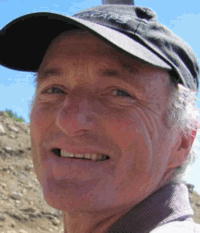 Professor Graham Wallis has been at the University of Otago since 1988, teaching in the Zoology and Genetics programmes and researching in molecular systematics, speciation and biogeography. He has published on a variety of NZ endemics, particularly galaxiid fishes and insects, as well as European newts. He has been particularly interested in how populationgenetic structuring is shaped by intrinsic life history (loss of diadromy or flight, host-parasite relationships) and extrinsic geological (uplift, river capture, mountain building) processes, and what happens where closely related taxa meet and hybridise. More recently, he has been working on the molecular evolution of a gene under strong positive selection expressed on the surface of galaxiid larvae. He has been Vice-President of the Society for the Study of Evolution, Chair of the Marsden EEB Panel, and Associate Editor for Molecular Ecology, Pacific Conservation Biology and PeerJ.
Professor Graham Wallis has been at the University of Otago since 1988, teaching in the Zoology and Genetics programmes and researching in molecular systematics, speciation and biogeography. He has published on a variety of NZ endemics, particularly galaxiid fishes and insects, as well as European newts. He has been particularly interested in how populationgenetic structuring is shaped by intrinsic life history (loss of diadromy or flight, host-parasite relationships) and extrinsic geological (uplift, river capture, mountain building) processes, and what happens where closely related taxa meet and hybridise. More recently, he has been working on the molecular evolution of a gene under strong positive selection expressed on the surface of galaxiid larvae. He has been Vice-President of the Society for the Study of Evolution, Chair of the Marsden EEB Panel, and Associate Editor for Molecular Ecology, Pacific Conservation Biology and PeerJ.
Engineering and Computer Science
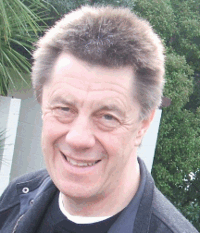 Rick Millane received his PhD degree in Electrical Engineering from the University of Canterbury. He was on the faculty at Purdue University in the U.S. for 20 years and is currently a Professor in the Department of Electrical and Computer Engineering at Canterbury. His research interests are computational imaging, image reconstruction, phase retrieval, and diffraction by disordered systems with particular application to x-ray diffraction imaging in structural biology, as well as in medical imaging and remote sensing. He is a Fellow of OSA, SPIE, RSNZ and IPENZ. He was awarded the RSNZ T.K. Sidey Medal in 2016 and the University of Canterbury Research Medal in 2018. His current research focus in concerned with the application of x-ray free-electron lasers, particularly new data processing algorithms, for biomolecular imaging.
Rick Millane received his PhD degree in Electrical Engineering from the University of Canterbury. He was on the faculty at Purdue University in the U.S. for 20 years and is currently a Professor in the Department of Electrical and Computer Engineering at Canterbury. His research interests are computational imaging, image reconstruction, phase retrieval, and diffraction by disordered systems with particular application to x-ray diffraction imaging in structural biology, as well as in medical imaging and remote sensing. He is a Fellow of OSA, SPIE, RSNZ and IPENZ. He was awarded the RSNZ T.K. Sidey Medal in 2016 and the University of Canterbury Research Medal in 2018. His current research focus in concerned with the application of x-ray free-electron lasers, particularly new data processing algorithms, for biomolecular imaging.
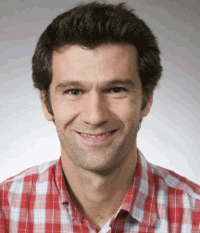 Mathieu Sellier is a Professor of Fluid Mechanics in the Department of Mechanical Engineering at the University of Canterbury. He graduated with a Masters in Modelling and Simulation in Mechanics from the Université Grenoble Alpes (France) in 2000, then got his PhD from the University of Leeds (UK) in 2003 for a thesis related to the modelling of the flow of thin films and droplets on complex surfaces. From 2003 to 2006, he was a postdoc at the Fraunhofer Institute for Industrial Mathematics (Kaiserslautern, Germany) in the Marie-Curie Research Training Network MAGICAL (Mathematics for the Glass Industry Computations and Analysis). Professor Sellier started at the University of Canterbury as a Lecturer in Theoretical Fluid Mechanics in 2006 and has developed since a broad research programme at the cross-road between engineering and applied mathematics revolving around the modelling of free surface or multiphase flows at small scales (microfluidics) and large ones (geophysical flows).
Mathieu Sellier is a Professor of Fluid Mechanics in the Department of Mechanical Engineering at the University of Canterbury. He graduated with a Masters in Modelling and Simulation in Mechanics from the Université Grenoble Alpes (France) in 2000, then got his PhD from the University of Leeds (UK) in 2003 for a thesis related to the modelling of the flow of thin films and droplets on complex surfaces. From 2003 to 2006, he was a postdoc at the Fraunhofer Institute for Industrial Mathematics (Kaiserslautern, Germany) in the Marie-Curie Research Training Network MAGICAL (Mathematics for the Glass Industry Computations and Analysis). Professor Sellier started at the University of Canterbury as a Lecturer in Theoretical Fluid Mechanics in 2006 and has developed since a broad research programme at the cross-road between engineering and applied mathematics revolving around the modelling of free surface or multiphase flows at small scales (microfluidics) and large ones (geophysical flows).
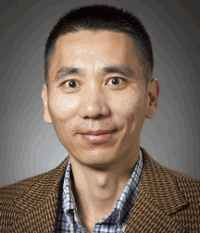 Dan Zhao is an Associate Professor in Aerospace Engineering, at Department of Mechanical Engineering, University of Canterbury. Dan’s research experience and interests include heat and mass transfer (drying), thermoacoustics, aeroacoustics, energy harvesting, noise control, aerodynamics, renewable energy, combustion and propulsion (gas turbines, ramjet, Scramjet, rockets). Before relocating to New Zealand, he worked in Silixa Ltd UK as an engineer and Nanyang Technological University in Singapore. By now, he has published more than 90 SCI-indexed papers on various targeted journals, and supervised more than 11 postdoc Fellows and PhD students funded by different companies and agencies. Dan’s publications have garnered over 1,800 citations and his h-index is approximately 24. Besides being a passionate researcher and journal reviewer, he is quite active in contributing to the academic communities by acting as an Associate Editor of journals such as AIAA Journal, Aerospace Science and Technology, Progress in Aerospace Sciences, International Journal of Aerospace Engineering, and Low Frequency Noise, Vibration & Active Control.
Dan Zhao is an Associate Professor in Aerospace Engineering, at Department of Mechanical Engineering, University of Canterbury. Dan’s research experience and interests include heat and mass transfer (drying), thermoacoustics, aeroacoustics, energy harvesting, noise control, aerodynamics, renewable energy, combustion and propulsion (gas turbines, ramjet, Scramjet, rockets). Before relocating to New Zealand, he worked in Silixa Ltd UK as an engineer and Nanyang Technological University in Singapore. By now, he has published more than 90 SCI-indexed papers on various targeted journals, and supervised more than 11 postdoc Fellows and PhD students funded by different companies and agencies. Dan’s publications have garnered over 1,800 citations and his h-index is approximately 24. Besides being a passionate researcher and journal reviewer, he is quite active in contributing to the academic communities by acting as an Associate Editor of journals such as AIAA Journal, Aerospace Science and Technology, Progress in Aerospace Sciences, International Journal of Aerospace Engineering, and Low Frequency Noise, Vibration & Active Control.
Physics and Astronomy
 Niels Kjærgaard is an Associate Professor of Physics at the University of Otago. He is co-Director of Quantum Science Otago and a Principal Investigator of the Dodd-Walls Centre for Photonic and Quantum Technologies. He earned his PhD from Aarhus University, Denmark, on laser cooled ions in traps and large-scale particle accelerators. He has held positions at Risø National Laboratory, the Niels Bohr Institute and the Danish Institute for Fundamental Metrology. Since 2010, he has resided in New Zealand, where his research group have constructed a laser-based collider to perform scattering experiments on ultracold atomic gases. They have also implemented a 3D optical tweezer platform that can pinch and manipulate quantum fluids of both bosonic and fermionic character to control their dynamics and investigate their interaction with light. He received Otago’s Division of Sciences Senior Teacher Award in 2016 and has held editorial appointments with Journal of Modern Optics and Scientific Reports.
Niels Kjærgaard is an Associate Professor of Physics at the University of Otago. He is co-Director of Quantum Science Otago and a Principal Investigator of the Dodd-Walls Centre for Photonic and Quantum Technologies. He earned his PhD from Aarhus University, Denmark, on laser cooled ions in traps and large-scale particle accelerators. He has held positions at Risø National Laboratory, the Niels Bohr Institute and the Danish Institute for Fundamental Metrology. Since 2010, he has resided in New Zealand, where his research group have constructed a laser-based collider to perform scattering experiments on ultracold atomic gases. They have also implemented a 3D optical tweezer platform that can pinch and manipulate quantum fluids of both bosonic and fermionic character to control their dynamics and investigate their interaction with light. He received Otago’s Division of Sciences Senior Teacher Award in 2016 and has held editorial appointments with Journal of Modern Optics and Scientific Reports.
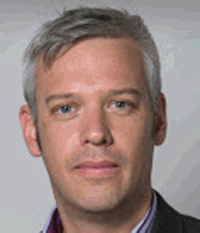 Dr Nicholas Rattenbury is a Senior Lecturer at Department of Physics, University of Auckland. He is the current President of the Royal Astronomical Society of New Zealand, and the National Representative to the International Astronomical Union for New Zealand. He leads the development of subsystems for nanosatellites, including electric propulsion, synthetic aperture radar and imaging technologies. He also guides cross-disciplinary undergraduate student teams to design and develop space missions as part of the regular mission design competition held by the Auckland Programme for Space Systems. Dr Rattenbury’s efforts are inherently cross-disciplinary; he works with colleagues in Engineering, Computer Science, Marine Science and Mathematics, as well as in Physics. His main research background is the detection of extra-solar planets through gravitational microlensing. Dr Rattenbury’s aim is to bring these disciplines together in plans for New Zealand’s first space telescope. His peer-reviewed publication record extends over several major topics in his field of astrophysics.
Dr Nicholas Rattenbury is a Senior Lecturer at Department of Physics, University of Auckland. He is the current President of the Royal Astronomical Society of New Zealand, and the National Representative to the International Astronomical Union for New Zealand. He leads the development of subsystems for nanosatellites, including electric propulsion, synthetic aperture radar and imaging technologies. He also guides cross-disciplinary undergraduate student teams to design and develop space missions as part of the regular mission design competition held by the Auckland Programme for Space Systems. Dr Rattenbury’s efforts are inherently cross-disciplinary; he works with colleagues in Engineering, Computer Science, Marine Science and Mathematics, as well as in Physics. His main research background is the detection of extra-solar planets through gravitational microlensing. Dr Rattenbury’s aim is to bring these disciplines together in plans for New Zealand’s first space telescope. His peer-reviewed publication record extends over several major topics in his field of astrophysics.
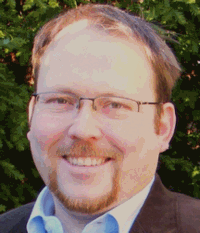 Dr Daniel Schumayer’s background is in theoretical and mathematical physics. He has earned his doctorate in Physics from the Budapest University of Technology, Hungary in 2004, then joined the University of Otago as a Postdoctoral Fellow and later became a Lecturer. Previously he has been the Honorary Secretary of the New Zealand Society of Physics, and in 2018 the American Physical Society has awarded him with an Outstanding Referee title.He has studied soliton in nonlinear systems using inverse scattering transform. Fascinated by the connection between physics and number theory, he has constructed quantum mechanical model with spectrum related to the Riemann Hypothesis. His work in Path Integral Monte Carlo calculation predicted the existence of rotons in ultracold boson gas. His current interests include developing inference techniques to industrial problems, examining Bose-Hubbard models on graphs with specific connectivity structure, analysing the Fisher zeros for phase transitions and various topics in Physics Education research.
Dr Daniel Schumayer’s background is in theoretical and mathematical physics. He has earned his doctorate in Physics from the Budapest University of Technology, Hungary in 2004, then joined the University of Otago as a Postdoctoral Fellow and later became a Lecturer. Previously he has been the Honorary Secretary of the New Zealand Society of Physics, and in 2018 the American Physical Society has awarded him with an Outstanding Referee title.He has studied soliton in nonlinear systems using inverse scattering transform. Fascinated by the connection between physics and number theory, he has constructed quantum mechanical model with spectrum related to the Riemann Hypothesis. His work in Path Integral Monte Carlo calculation predicted the existence of rotons in ultracold boson gas. His current interests include developing inference techniques to industrial problems, examining Bose-Hubbard models on graphs with specific connectivity structure, analysing the Fisher zeros for phase transitions and various topics in Physics Education research.
Psychology and Neuroscience
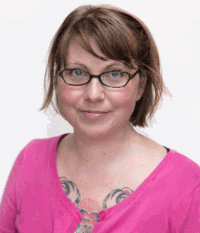 Dr Erika Freemantle is a Research Fellow at the University of Auckland. Her research interests span genetics, proteomics, and electrophysiology to elucidate the basis of neurological disorders. She has published in a variety of journals most recently Journal of Neuroscience, Nature Medicine, and Molecular Psychiatry and has held government funding at the doctoral and post-doctoral levels. Her formative training was obtained at McGill University studying the genetics of depressive disorders. Following her PhD in 2013, she pursued a post-doc in Finland studying kinase signalling cascades before returning to Montréal in 2014 to study dendrite localised translation in synaptic plasticity and autism. From there, she arrived in the lab of Dr. Maurice Curtis at the Centre for Brain Research in 2018 and is currently the treasurer of the FMHS post-doctoral society. Erika is a keen contributor to the peer-review process including over a dozen journals. Erika’s current research involves neurodegeneration and synaptic plasticity using a variety of electrophysiological and morphological approaches.
Dr Erika Freemantle is a Research Fellow at the University of Auckland. Her research interests span genetics, proteomics, and electrophysiology to elucidate the basis of neurological disorders. She has published in a variety of journals most recently Journal of Neuroscience, Nature Medicine, and Molecular Psychiatry and has held government funding at the doctoral and post-doctoral levels. Her formative training was obtained at McGill University studying the genetics of depressive disorders. Following her PhD in 2013, she pursued a post-doc in Finland studying kinase signalling cascades before returning to Montréal in 2014 to study dendrite localised translation in synaptic plasticity and autism. From there, she arrived in the lab of Dr. Maurice Curtis at the Centre for Brain Research in 2018 and is currently the treasurer of the FMHS post-doctoral society. Erika is a keen contributor to the peer-review process including over a dozen journals. Erika’s current research involves neurodegeneration and synaptic plasticity using a variety of electrophysiological and morphological approaches.
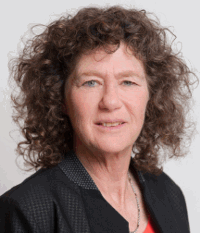 Professor Susan Schenk is a behavioural pharmacologist. She received the PhD from Concordia University (Montreal, Canada) in 1983. She received an NSERC post-doctoral fellowship from NSERC (Canada) and worked under the tutelage of Professor Peter Milner. She then accepted a position as Assistant Professor of Psychology at Texas A&M University in College Station, Texas. She rose through the ranks to Professor and in 2001 she accepted a position as Research Professor of Psychology at Victoria University of Wellington. Susan was Head of Psychology VUW (2003–2006) and Associate Dean for Research in the Faculty of Science at VUW (2012–15). She has published more than 100 papers in peer-reviewed international journals and her research papers have been cited more than 5000 times. She has received more than NZ$5 million in research funding including grants from NSERC (Canada), the NIH (USA), Lottery Health (NZ), Neurological Foundation (NZ) and Marsden (NZ).
Professor Susan Schenk is a behavioural pharmacologist. She received the PhD from Concordia University (Montreal, Canada) in 1983. She received an NSERC post-doctoral fellowship from NSERC (Canada) and worked under the tutelage of Professor Peter Milner. She then accepted a position as Assistant Professor of Psychology at Texas A&M University in College Station, Texas. She rose through the ranks to Professor and in 2001 she accepted a position as Research Professor of Psychology at Victoria University of Wellington. Susan was Head of Psychology VUW (2003–2006) and Associate Dean for Research in the Faculty of Science at VUW (2012–15). She has published more than 100 papers in peer-reviewed international journals and her research papers have been cited more than 5000 times. She has received more than NZ$5 million in research funding including grants from NSERC (Canada), the NIH (USA), Lottery Health (NZ), Neurological Foundation (NZ) and Marsden (NZ).
Earth Sciences
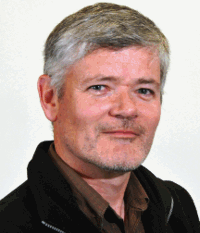 Dr Nick Mortimer FRSNZ is a geologist and Principal Scientist at GNS Science’s Dunedin Research Centre. He is interested in all aspects of the onland and offshore geology and geophysics of New Zealand, the continent of Zealandia and neighbouring parts of Antarctica and Australia, both ancient and modern. He has participated in several scientific voyages in the SW Pacific. Most of Nick’s research uses petrology, geochemistry, geochronology and structural geology to solve regional tectonic problems, thereby providing a broad context and framework for more detailed work by others. In addition to his more than 100 research papers, he has co-authored more than 40 client reports for government departments, mineral and oil exploration companies, food quality assurance agencies, hydroelectric power generators and overseas geological surveys. Nick was President of the Geological Society of New Zealand from 2007 to 2009, and Senior Editor of the New Zealand Journal of Geology and Geophysics from 2013 to 2017.
Dr Nick Mortimer FRSNZ is a geologist and Principal Scientist at GNS Science’s Dunedin Research Centre. He is interested in all aspects of the onland and offshore geology and geophysics of New Zealand, the continent of Zealandia and neighbouring parts of Antarctica and Australia, both ancient and modern. He has participated in several scientific voyages in the SW Pacific. Most of Nick’s research uses petrology, geochemistry, geochronology and structural geology to solve regional tectonic problems, thereby providing a broad context and framework for more detailed work by others. In addition to his more than 100 research papers, he has co-authored more than 40 client reports for government departments, mineral and oil exploration companies, food quality assurance agencies, hydroelectric power generators and overseas geological surveys. Nick was President of the Geological Society of New Zealand from 2007 to 2009, and Senior Editor of the New Zealand Journal of Geology and Geophysics from 2013 to 2017.
Social Sciences
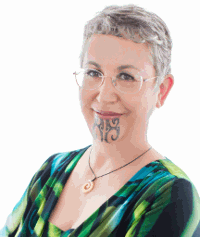 Georgina Tuari Stewart (ko Whakarārā te maunga, ko Matauri te moana, ko Ngāti Kura te hapū, ko Ngāpuhi-nui-tonu te iwi) is an Associate Professor at Te Kura Mātauranga/School of Education at AUT in Auckland. Georgina is a former teacher of Science, Mathematics and Te Reo Māori in Māori-medium and English-medium schools, and has 25+ years’ experience in national curriculum and assessment developments. In 2007 she completed her doctoral thesis researching the Māori science curriculum. Between 2010 and 2016 she worked at University of Auckland Faculty of Education, based at the Tai Tokerau campus in Whangarei, teaching initial teacher education and postgraduate education courses and research supervision. In 2014 she won a Marsden grant to investigate writing educational research and scholarship in Māori and in July 2016 she moved to AUT. She has a forthcoming book (Bloomsbury Books, UK) titled Māori Philosophy. She is Co-Editor-in-Chief of the Springer journal, New Zealand Journal of Educational Studies.
Georgina Tuari Stewart (ko Whakarārā te maunga, ko Matauri te moana, ko Ngāti Kura te hapū, ko Ngāpuhi-nui-tonu te iwi) is an Associate Professor at Te Kura Mātauranga/School of Education at AUT in Auckland. Georgina is a former teacher of Science, Mathematics and Te Reo Māori in Māori-medium and English-medium schools, and has 25+ years’ experience in national curriculum and assessment developments. In 2007 she completed her doctoral thesis researching the Māori science curriculum. Between 2010 and 2016 she worked at University of Auckland Faculty of Education, based at the Tai Tokerau campus in Whangarei, teaching initial teacher education and postgraduate education courses and research supervision. In 2014 she won a Marsden grant to investigate writing educational research and scholarship in Māori and in July 2016 she moved to AUT. She has a forthcoming book (Bloomsbury Books, UK) titled Māori Philosophy. She is Co-Editor-in-Chief of the Springer journal, New Zealand Journal of Educational Studies.
Arts and Humanities
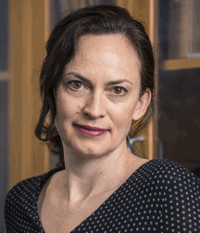 Rebecca Priestley is an Associate Professor and Director of the Centre for Science in Society at Victoria University of Wellington. Rebecca has 25+ years’ experience working in science communication and public engagement with science in New Zealand. She has degrees in earth sciences, history and philosophy of science, and creative writing. In 2010 she completed her doctoral thesis researching New Zealand’s nuclear history, which was published as Mad on Radium: New Zealand in the Atomic Age (Auckland University Press). Her edited books cover New Zealand science history (The Awa Book of New Zealand Science, Awa Press; Atoms, Dinosaurs & DNA, Random House), Antarctic science history (Dispatches from Continent Seven, Awa Press), and international response to the Fukushima disaster (The Fukushima Effect, Routledge). She is a Principal Investigator with the Centre of Research Excellence Te Pūnaha Matatini, an investigator on the NZ SeaRise programme, and Chair of the Antarctic Science Platform’s Expert Group on Public Engagement with Science.
Rebecca Priestley is an Associate Professor and Director of the Centre for Science in Society at Victoria University of Wellington. Rebecca has 25+ years’ experience working in science communication and public engagement with science in New Zealand. She has degrees in earth sciences, history and philosophy of science, and creative writing. In 2010 she completed her doctoral thesis researching New Zealand’s nuclear history, which was published as Mad on Radium: New Zealand in the Atomic Age (Auckland University Press). Her edited books cover New Zealand science history (The Awa Book of New Zealand Science, Awa Press; Atoms, Dinosaurs & DNA, Random House), Antarctic science history (Dispatches from Continent Seven, Awa Press), and international response to the Fukushima disaster (The Fukushima Effect, Routledge). She is a Principal Investigator with the Centre of Research Excellence Te Pūnaha Matatini, an investigator on the NZ SeaRise programme, and Chair of the Antarctic Science Platform’s Expert Group on Public Engagement with Science.
